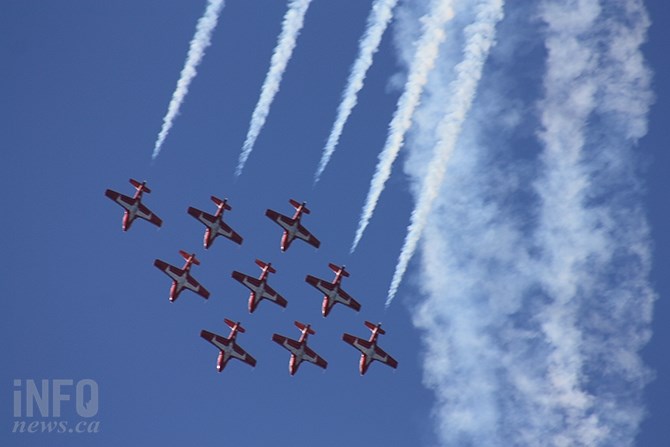
Canadian Forces Snowbirds performing over Penticton, Aug. 7, 2019.
(STEVE ARSTAD / iNFOnews.ca)
June 04, 2020 - 7:30 AM
Out of all the bird strikes recorded by the Royal Canadian Air Force in the past ten years, few of them cause damage to the aircraft.
The ones that cause significant enough damage to affect the airworthiness of the craft make up about 1% of all incidences, Director of Flight Safety Col. John Alexander said.
Earlier this week, Flight Safety Investigators announced that the Snowbird crash in Kamloops was likely caused by a bird strike.
Snowbirds aerobatic team public affairs officer Capt. Jenn Casey was killed in the incident, and pilot Capt. Richard MacDougall was injured shortly after takeoff from the Kamloops airport May 17.
In the video of the crash, investigators say that a bird can be seen in very close proximity to the aircraft's right engine intake during a critical phase of take-off, according to a June 1 report.
When a bird hits an engine, the effect depends on the size of the bird, the speed the aircraft is going and the size of its engine.
"The level of damage could range from no damage at all, to the potential of disabling the engine altogether," Alexander said.
The speed of the plane combined with the mass of the bird determines how much damage it does to the engine.
All bird strikes are documented by the Air Force whether the bird does damage or not.
"Over the course of the last ten years, we've recorded 1,587 bird strikes," he said. "Of those, interestingly, 87% of them don't cause any damage at all."
In 12% of the cases, only minor damage occurred.
"It's typically when the bird will glance off, it might cause a gouge in the paint or something like that," he said.
Bird strikes that cause damage requiring repair make up the remaining cases, and generally will rarely cause an aircraft to crash.
Bird strikes are something all Air Force pilots are trained to avoid and expect.
"We teach pilots about birds, and peculiarities about birds that they need to be aware of, times of year to avoid flying," Alexander said.
For example, Canada Geese will look for a place to land around dusk during their migratory season, so pilots should avoid flying at that time.
In his early training as a helicopter pilot, Alexander said because he flies in a low level environment, he was taught the behaviours of birds of prey.
"If you fly under them with a helicopter, their natural instinct is to want to tuck their wings and go into a dive, because that’s how they evade their predator," he said. "You don’t want to underfly them."
However, behaviours of some species, such as pigeons, are less predictable.
This is where simulator training comes into play.
RCAF crews routinely undergo tests which require them to respond to emergency situations in flight, such as losing an engine or some controls in the aircraft.
"It is very much drilled into our training how to handle an aircraft in an emergency of any nature," Alexander said.
Their aircraft is also designed with bird strikes in mind, built with fortified windows and engineering to protect components vulnerable to strikes.
Alexander has hit birds in his career as a pilot, most of which caused no damage to his aircraft.
"I had one occasion a number of years ago… where two of my front windscreens were shattered by a birdstrike," he said.
"But again, we were able to recover very safely back to an airport without difficulty.”
The investigation into the causes behind the Snowbird crash last month is still underway. Investigators are focusing on environmental factors such as a bird strike, as well as the performance of the escape system.
The final report on the investigation has no date set for release thus far.
The report will include cause factors, preventive measures taken, and recommended preventive measures to follow.
Find more stories on the Snowbird crash here.
To contact a reporter for this story, email Brie Welton or call (250) 819-3723 or email the editor. You can also submit photos, videos or news tips to the newsroom and be entered to win a monthly prize draw.
We welcome your comments and opinions on our stories but play nice. We won't censor or delete comments unless they contain off-topic statements or links, unnecessary vulgarity, false facts, spam or obviously fake profiles. If you have any concerns about what you see in comments, email the editor in the link above.
News from © iNFOnews, 2020